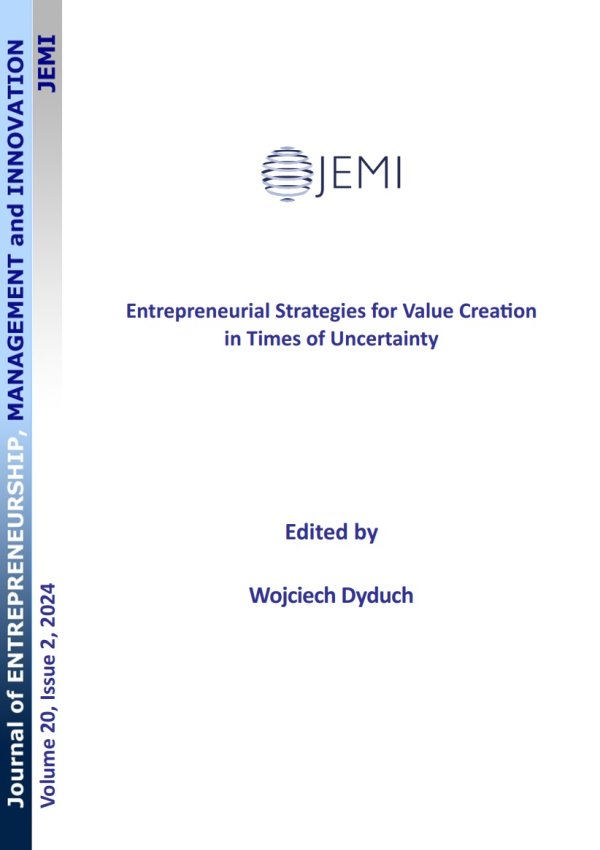Wojciech Dyduch, Guest Editor, University of Economics in Katowice, Poland
|
Latest publications:
|
Aims and Scope of the Call for Paper
The changes induced by recent experience of a global pandemic, the break of war in Europe, high-level inflation, disturbed energy markets, political uncertainty, as well as changing sources of opportunities and value creation, shape the environment in which organizations operate today.
At the same time, new technologies, digitization, artificial intelligence, changing work, business models are affecting the nature of work, human relations, leadership, and ways of communication. Some of the major and long-term challenges that societies, organizations, and individuals face are climate change, global health, and poverty concerns, which require developing specific leadership skills necessary to reconcile various paradoxes and expectations with adapting to the external environment changes.
With this dynamic environment in mind, resulting from the short-term anomalies and surprises, one of the major challenges that organizations and entrepreneurs face is how to identify new sources of opportunities, and how to exploit opportunities that will be the basis of value creation and value capture.
The significant task of contemporary strategic management is to look for sources of value and to achieve above-average firm performance. Moreover, entrepreneurial strategy is seen as handling the dynamics of relations between an organization and its environment, where resources and actions are committed to sense and seize opportunities effectively. To answer the question why to-date certain organizations create more value than other, and why some of them achieve higher performance, strategic management has adapted various theoretical perspectives over time, strategic entrepreneurship being one of them. While entrepreneurship involves sensing and seizing opportunities, it also requires strategic thinking, especially in the dynamic times, to better adapt to the environment, exploit opportunities, and better prepare for the future.
Although scholarly discussion scrutinized the subject of strategic entrepreneurship and entrepreneurial strategies, the crises and uncertainties appearing in recent years, as well as their consequences make it necessary to revise and update the theoretical propositions and empirical research in this area.
This JEMI Issue seeks to encourage research that offers novel insights into the strategic entrepreneurship by identifying strategies that both entrepreneurs and companies formulate and implement to-date. The issue welcomes theoretical and empirical proposals that will broaden the understanding of how strategic entrepreneurship handles the new organizational phenomena and will lead to theoretical explanations of them. We seek for papers that would extend the theoretical underpinnings of entrepreneurial strategies for value creation in uncertain times we are witnessing:
Some examples of research topics may include:
- What are the new entrepreneurial strategies that entrepreneurs and organizations create and implement?
- How can organizations effectively identify and exploit opportunities in turbulent times?
- What are the current sources of organizational innovativeness?
- What are the new sources of value creation and value capture?
- What are the strategic responses of firms in times of crises and uncertainty?
- How is the entrepreneurial orientation of the firms changing?
- What are the key organizational or managerial capabilities to lead in times of uncertainty?
- How do employees, managers, and organizations manage to deal with new work models, business models as well as dynamic environments?
- How has leadership changed in the post-pandemic era?
- What can be the new strategic ways of designing and preparing for the future no organization has thought about yet?
- How can organizations reconcile the appearing strategic paradoxes and contradictions?
- How to integrate entrepreneurship and strategic thinking in times of uncertainty?
We seek to publish original, important, and theoretically grounded studies based on quantitative, qualitative, mixed, or other empirical methods. Given the nature of many topics associated with the theme of this issue, we encourage Authors to explain how practitioners can benefit from their new research insights.
Submission Guidelines
Submission deadline: July 30, 2023
Reviewed papers: September 30, 2023
Final version of papers: November 30, 2023
Issue published: 2024
Please submit the paper proposals to JEMI (indicating the title of the thematic issue: Entrepreneurial strategies for value creation in times of uncertainty) at This email address is being protected from spambots. You need JavaScript enabled to view it.
Papers that pass the initial vetting process will undergo a double-blind review. Submissions must be in English between 8,000 - 12,000 words. All submissions must follow the submission requirements (paper template, title page, declaration for authors, etc.) posted on the JEMI website at http://jemi.edu.pl/submission-and-policy. Papers not adjusted to our formal guidelines will be desk rejected.
References
- Dias, Á., Patuleia, M., Silva, R., Estêvão, J., & González-Rodríguez, M. R. (2022). Post-pandemic recovery strategies: Revitalizing lifestyle entrepreneurship. Journal of Policy Research in Tourism, Leisure and Events, 14(2), 97-114.
- Hitt, M. A., Arregle, J. L., & Holmes Jr, R. M. (2021). Strategic management theory in a post‐pandemic and non‐ergodic world. Journal of Management Studies, 58(1), 259.
- Hitt, M. A., Ireland, R. D., Camp, S. M., & Sexton, D. L. (2017). Strategic entrepreneurship: Integrating entrepreneurial and strategic management perspectives. Strategic entrepreneurship: Creating a New Mindset, 1-16.
- Ketchen Jr, D. J., & Craighead, C. W. (2020). Research at the intersection of entrepreneurship, supply chain management, and strategic management: Opportunities highlighted by COVID-19. Journal of Management, 46(8), 1330-1341.
- Ratten, V. (2021). COVID‐19 and entrepreneurship: Future research directions. Strategic Change, 30(2), 91-98.
- Schröder, K., Tiberius, V., Bouncken, R. B., & Kraus, S. (2021). Strategic entrepreneurship: Mapping a research field. International Journal of Entrepreneurial Behavior & Research, 27(3), 753-776.







 Professor Wojciech Dyduch is a researcher in strategic management and organizational entrepreneurship at the University of Economics in Katowice, where he runs the Faculty of Management, and the Department of Entrepreneurship. He is a President of the Organization and Management Sciences Committee at the Polish Academy of Sciences, and a member of the Scientific Excellence Council. To date, Professor Dyduch has researched the problems of value creation and capture in entrepreneurial organizations, creative strategy in organizations, organizational entrepreneurship measurement, as well as strategic responses to crises. His passions include visual astronomy, macrophotography, swimming, and snowboarding.
Professor Wojciech Dyduch is a researcher in strategic management and organizational entrepreneurship at the University of Economics in Katowice, where he runs the Faculty of Management, and the Department of Entrepreneurship. He is a President of the Organization and Management Sciences Committee at the Polish Academy of Sciences, and a member of the Scientific Excellence Council. To date, Professor Dyduch has researched the problems of value creation and capture in entrepreneurial organizations, creative strategy in organizations, organizational entrepreneurship measurement, as well as strategic responses to crises. His passions include visual astronomy, macrophotography, swimming, and snowboarding.